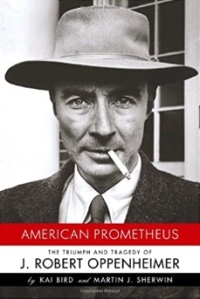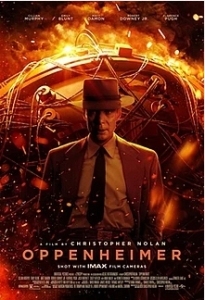‘American Prometheus’ – Remembering the book that inspired the movie
“Oppenheimer’s warnings were ignored—and ultimately, he was silenced. Like that rebellious Greek god Prometheus—who stole fire from Zeus and bestowed it upon humankind, Oppenheimer gave us atomic fire. But then, when he tried to control it, when he sought to make us aware of its terrible dangers, the powers-that-be, like Zeus, rose up in anger to punish him.” American Prometheus by Kai Bird and Martin J. Sherwin (2005)
Before the United States was done with Julius Robert Oppenheimer (April 22, 1904 – February 18, 1967), he was declared a security risk by the Eisenhower administration. You learn this on the first page of this definitive, Pulitzer-Prize-winning book about a mystic and theoretical physicist who was as complex as his Nobel-Prize-worthy work that was far flung from nuclear weapons.
From the Publisher
 American Prometheus is the first full-scale biography of J. Robert Oppenheimer, “father of the atomic bomb,” the brilliant, charismatic physicist who led the effort to capture the awesome fire of the sun for his country in time of war. Immediately after Hiroshima, he became the most famous scientist of his generation–one of the iconic figures of the twentieth century, the embodiment of modern man confronting the consequences of scientific progress.
American Prometheus is the first full-scale biography of J. Robert Oppenheimer, “father of the atomic bomb,” the brilliant, charismatic physicist who led the effort to capture the awesome fire of the sun for his country in time of war. Immediately after Hiroshima, he became the most famous scientist of his generation–one of the iconic figures of the twentieth century, the embodiment of modern man confronting the consequences of scientific progress.
He was the author of a radical proposal to place international controls over atomic materials–an idea that is still relevant today. He opposed the development of the hydrogen bomb and criticized the Air Force’s plans to fight an infinitely dangerous nuclear war. In the now almost-forgotten hysteria of the early 1950s, his ideas were anathema to powerful advocates of a massive nuclear buildup, and, in response, Atomic Energy Commission chairman Lewis Strauss, Superbomb advocate Edward Teller and FBI director J. Edgar Hoover worked behind the scenes to have a hearing board find that Oppenheimer could not be trusted with America’s nuclear secrets.
American Prometheus sets forth Oppenheimer’s life and times in revealing and unprecedented detail. Exhaustively researched, it is based on thousands of records and letters gathered from archives in America and abroad, on massive FBI files and on close to a hundred interviews with Oppenheimer’s friends, relatives and colleagues.
We follow him from his earliest education at the turn of the twentieth century at New York City’s Ethical Culture School, through personal crises at Harvard and Cambridge universities. Then to Germany, where he studied quantum physics with the world’s most accomplished theorists; and to Berkeley, California, where he established, during the 1930s, the leading American school of theoretical physics, and where he became deeply involved with social justice causes and their advocates, many of whom were communists. Then to Los Alamos, New Mexico, where he transformed a bleak mesa into the world’s most potent nuclear weapons laboratory–and where he himself was transformed. And finally, to the Institute for Advanced Study in Princeton, which he directed from 1947 to 1966.
American Prometheus is a rich evocation of America at midcentury, a new and compelling portrait of a brilliant, ambitious, complex and flawed man profoundly connected to its major events–the Depression, World War II and the Cold War. It is at once biography and history, and essential to our understanding of our recent past–and of our choices for the future.
From Kirkus ReviewsThat Oppenheimer (1904–67) was a rare genius is beyond doubt; his colleagues at CalTech, Göttingen and Los Alamos were impressed to the point of being cowed by his intellect, and “Oppie” was far ahead of even his professors in the new world of quantum theory. He was a rare bird in other ways as well. A child of privilege whose very luggage excited discussion among his cash-strapped European colleagues, he identified early with left-wing causes and was reportedly better read in the classics of Marxism than most Communist theoreticians; and, though a leftist, he expressed enough fondness for the U.S. that those European colleagues sometimes thought him a chauvinist. Worldly in many ways, he was something of a naïf. In time, he shed some of his clumsiness and became the model of a committed intellectual, unusually generous in sharing credit with students and colleagues and able to wear his achievements lightly. (“I can make it clearer,” he once remarked of a thorny physics problem, “but I can’t make it simpler.”) The authors lucidly explain Oppenheimer’s many scientific accomplishments and the finer points of quantum mechanics. More, they examine his life in a political context, for, though one of the fathers of the atomic bomb, Oppenheimer warned against its proliferation and noted, as early as 1946, that our major cities were now susceptible to terrorist attack, the only defense being a screwdriver—to open “each and every crate or suitcase.” His prescience and conscience cost him dearly: Oppie was effectively blacklisted for more than a decade and rehabilitated only at the end of his too-short life.
A swiftly moving narrative full of morality tales and juicy gossip. One of the best scientific biographies to appear in recent years.
 If the Christopher Nolan feature film has captured your attention and interest in the father of the bomb and you want to know more, American Prometheus is a good starting point. As Wikipedia notes, “The film was released on the same day as Barbie, a fantasy comedy film directed by Greta Gerwig based on Mattel’s Barbie fashion dolls and media franchise, and distributed by Warner Bros. Due to the tonal and genre contrast between the two films, many social media users created memes about how the two films appealed to different audiences, and how they should be viewed as a double feature. The trend was dubbed ‘Barbenheimer’. In an interview with La Vanguardia, Cillian Murphy endorsed the phenomenon, saying ‘My advice would be for people to go see both, on the same day. If they are good films, then that’s cinema’s gain.'”
If the Christopher Nolan feature film has captured your attention and interest in the father of the bomb and you want to know more, American Prometheus is a good starting point. As Wikipedia notes, “The film was released on the same day as Barbie, a fantasy comedy film directed by Greta Gerwig based on Mattel’s Barbie fashion dolls and media franchise, and distributed by Warner Bros. Due to the tonal and genre contrast between the two films, many social media users created memes about how the two films appealed to different audiences, and how they should be viewed as a double feature. The trend was dubbed ‘Barbenheimer’. In an interview with La Vanguardia, Cillian Murphy endorsed the phenomenon, saying ‘My advice would be for people to go see both, on the same day. If they are good films, then that’s cinema’s gain.'”
–Malcolm



